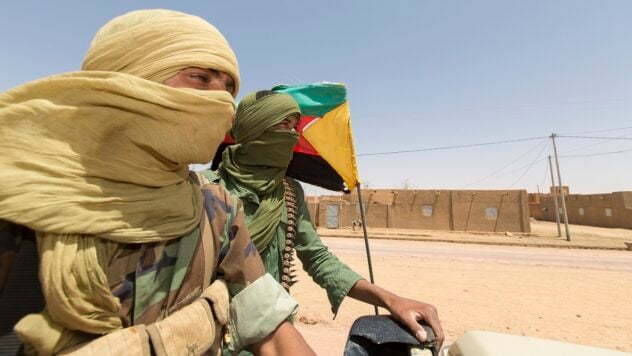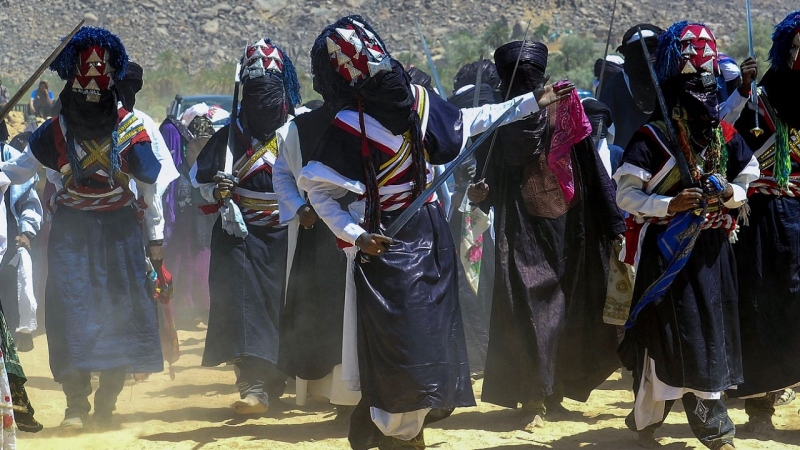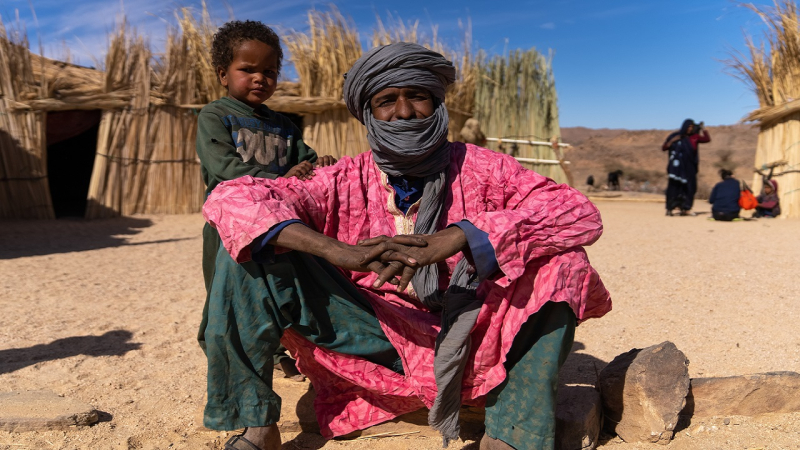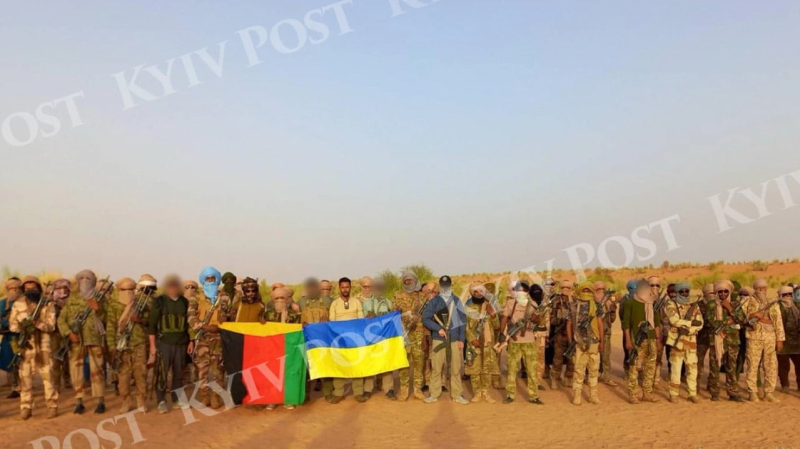
In Mali, in the northwestern part of the African continent, several days ago, Tuareg rebels attacked a group of mercenaries from the Wagner PMC. According to various sources, from 20 to more than 50 militants were eliminated.
ICTV Facts investigated who the Tuaregs are, what the Wagnerites are doing in Mali, and what the Kremlin's interests are in this country.
Who are the Tuaregs
The Tuareg are a semi-nomadic people living in northern Mali, Niger, Burkina Faso, Algeria and Libya. Their main activities are cattle breeding, agriculture and trade. The Tuareg are descended from the Berbers, an indigenous ethnic group of North Africa. They practice Sunni Islam.
Now watching
The Tuaregs are known to have migrated from what is now Libya in the 7th century CE. Since they are a nomadic people, they have not developed a centralized government. The political system of the Tuareg resembles a loose confederation, that is, a union, each member of which retains independence.
A characteristic feature of the Tuaregs is that they are the only Muslims in the world where men cover their faces, not women.

Getty Images
In the 18th and 19th centuries, the Tuaregs took black Africans as slaves. In the late 19th century, Mali (then called French Sudan or Western Sudan) became a colony of France. The French tried to put an end to the nomadic way of life of the Tuaregs. In 1917, they rebelled, but the French suppressed the resistance. Later, the Tuaregs began to take away their lands, force them into military service and labor.
And soon France's interest in the Sahara zone began to fade, and the Tuaregs hoped for the creation of an autonomous state of Azawad. These hopes turned into independent Mali.
In the 1960s, the Tuaregs of Mali attempted to ally with Algeria, but Mali's first president, Modibo Keita, brutally suppressed the attempt. The first half of the 1970s brought a severe drought to the Tuaregs. Between 1972 and 1974, about 40% of Mali's small and large cattle died. This forced the people to abandon their nomadic way of life and move to cities, refugee camps, or neighboring countries.
The government of Mali's second president, Moussa Traore, squandered most of the international aid intended for the Tuaregs. Traore's regime continued to disregard the rights of the people and treat them with hostility. In 1990, Tuareg rebels attacked government facilities in the city of Gao. The Malian military responded harshly. This ignited the flames of the uprisings.
The government of the next president, Alpha Oumar Konaré, elected in 1992, made peace with the rebels in northern Mali. Konaré agreed to reparations to the Tuaregs and an expansion of regional self-government. But the uprisings continued periodically, the Tuaregs felt like outsiders — many black Malians remembered the enslavement of their ancestors by the Tuaregs.
The Tuareg rebellion of 1990-96 was followed by a decade of uneasy peace, followed by a series of major insurgent outbreaks in an attempt to achieve independence.
Between 2009 and 2012, grievances among the Tuareg and other northern peoples led to an uprising against the Malian state, the declaration of independence of the Azawad region, and the subsequent presence of French and Malian troops in the north of the country.
Tuareg Matriarchy
The Tuareg are a matriarchal people. For example, a man must always consult his wife before making important decisions. Property and livestock belong to the woman.
After the wedding, a man must prove to his wife that he is worthy of being with her for a year. If he turns out to be bad, the woman can kick him out and choose a new husband. In the event of a divorce, the woman keeps the children and all property. Girls are taught to read and write from an early age, but it is not required for men.
Where do the Tuaregs live now
The Tuaregs, like the Kurds, do not have their own state. Today, the Tuareg people live in the northern territories of Mali, Niger, Algeria, Burkina Faso, Libya, Mauritania and other African countries.

Getty Images
Economy of Mali
The top brass in Mali are highly corrupt. Tourism, once a major part of the Tuareg and northern Malian economy, has declined due to kidnappings by al-Qaeda in the Islamic Maghreb (AQIM). The shadow economy has grown. Weapons and drug smuggling have become additional sources of income for Tuareg groups.
The Tuareg have become increasingly militant towards the government.
Terrorism in Mali
The United States viewed northern Mali as an area vulnerable to terrorism and conducted exercises with Malian troops. The Algerian-based extremist group AQIM has sought to recruit among disaffected Tuaregs. The group was behind the kidnapping of 32 European tourists on the Mali-Algeria border in 2003, and AQIM continued to kidnap people from 2008 to 2012.
Tuareg have been subject to persecution and repression both before and after the reconquest of the north by Malian and international forces, who suspected them of being rebels.
Accusations of human rights violations by MNLA (National Movement for the Liberation of Azawad, which included Tuaregs and other Sahrawi peoples), such as robberies, rapes and torture, have fueled ethnic tensions with southerners.
By the way, it is Islamist terrorists who have settled in eastern Mali, where they continue to create instability. And the Tuareg people are trying to establish a normal life for themselves.
Military mutinies in Mali 2020-2021
On August 18, 2020, the Malian military units under the command of Colonel Sadi Camara staged a state mutiny. The reason was a political crisis due to severe corruption and the dominance of Islamists in Azawad. As a result, the military detained a number of Malian officials, including President Ibrahim Boubacar Keita, who resigned and dissolved the government.
On August 19, the military junta created the so-called National Committee for the Salvation of the People, closed all borders, and imposed a curfew.
In 2021, the Malian junta asked Russia for help in ensuring security. This is how Wagner militants appeared in Mali.
Tuaregs killed and wounded dozens of Wagner mercenaries
On July 28, it became known that near the border with Algeria, Tuareg rebels killed and wounded dozens of Wagner mercenaries. Two Malian army soldiers were also killed. A number of Russian Telegram channels reported the deaths of at least 20 Wagner mercenaries. According to other sources, more than 50 were killed. And some say the figure is 80 killed.
The Tuareg rebels later posed for a photo with a Ukrainian flag. According to the Kyiv Post, the Ukrainian Security Forces confirmed the authenticity of the photo.

Photo: Kyiv Post
Russian propaganda traditionally accuses Ukraine and the head of the GUR Kirill Budanov of defeating the Wagner mercenaries.
The representative of the Main Intelligence Directorate of the Ministry of Defense of Ukraine Andriy Yusov stated on the air of Yediny Novyny that the Tuareg rebels received the necessary information and not only information, which allowed them to conduct a successful military operation against the Wagner mercenaries. Yusov refused to give any details.
Head of the Center for Military and Legal Research Oleksandr Musienkobelieves that Ukraine could convey to the Tuaregs certain information and coordinates of the location of the Wagnerites, and then the rebels, in a natural area for them and with the effect of surprise, already carried out this operation.
What the Wagnerites are doing in Mali
In a commentary to ICTV Facts, Alexander Musienko noted that the junta that came to power in Mali in 2021 openly advocated dialogue with Russia and was against the presence of French troops.
According to the expert, Russia, through its information influence, was preparing the ground for strengthening the policy against France in Mali and fueling pro-Russian sentiments.
— Why did the Malian junta turn to Russia? So that the Wagnerites could help the Malian army seize the entire territory of the country — establish complete control. Because the junta did not control and still does not control the entire territory of Mali, since in the north — there are Tuaregs who are fighting for their own statehood, and in the east — various Islamist terrorist groups — Al-Qaeda, the African branch of ISIS, notes Alexander Musienko.
And for the Wagnerites, the benefit of being in Mali is purely economic: they need income from gold and diamond mining.
As for Russia, it is trying to expand its influence in Africa through the Wagner PMC, and other countries can also turn to the services of mercenaries to meet their needs. This is how the African Corps emerged in its time, which, for example, helps guard mines in the Central African Republic and makes a profit from it.
What is Ukraine's interest in the situation with the Tuaregs
Alexander Musienko believes that it is very important for Ukraine when someone outside our country helps us in the fight against the Russian enemy.
The expert notes that the Tuaregs are waging an armed struggle against the Wagnerites, in particular against those who were in occupied Bakhmut and not only and who are actually involved in war crimes against Ukrainians. In his opinion, Ukrainians should be pragmatic — if there is an opportunity to fight the Wagnerites, the Russian troops in Africa, to prevent them from earning money for the war in Ukraine — then we should support it.
— Therefore, it is completely natural that these Tuaregs can be our allies — temporary, permanent or even situational … If these are Tuaregs who are ready to cooperate with us and help us, then we must cooperate with them, says Alexander Musienko.
The expert sees a good sign in the fact that Russian propaganda has already accused Ukraine of helping Tuareg rebels destroy a Wagner group on the border of Mali. In his opinion, Russians should realize that Ukraine is also capable of maintaining ties with African countries, conducting special operations to destroy the enemy, particularly in Africa.
— Therefore, it is very good that Russian propaganda considers Ukraine involved, — says the expert.
Where Wagner is present in Africa
Today, the Wagner PMC is part of the African Corps, which, in turn, includes a number of other mercenaries.
The largest presence of Wagnerites is in Mali, Burkina Faso and the Central African Republic. There is a small presence of Afrika Korps fighters in Libya and Algeria — but this is somewhat different from the Wagner PMC.
The interests are mainly economic everywhere — earning money for the war.
GUR operations in Sudan
The military ruler of Sudan, Lieutenant General Abdel Fattah al-Burkhan, turned to Ukrainian President Volodymyr Zelensky for help last summer. The reason — Sudan has seen the rise of the Russian-backed Rapid Reaction Force rebel group.
Zelensky had reason to take the request seriously, The Wall Street Journal notes, since Burhan had been secretly transferring weapons to Kiev almost immediately after Russia's attack on Ukraine in 2022. In addition, the Sudanese rebels were backed by Wagner, who controlled the country's gold production and used it to finance the war.
According to sources, within weeks of al-Burhan's request, Ukrainian paratroopers landed in Sudan and began an operation to drive rebel forces out of the capital, Khartoum.
For Ukraine, sending special forces to Africa meant undermining Russia's military and economic operations abroad, making the war more expensive for Moscow, and positioning itself as a bulwark against Russian incursions, particularly in regions where the West is unwilling to become directly involved.
—You can't defeat Russia by simply fighting on a small patch of land like the front lines in Ukraine. If they have gold mines in Sudan, we have to make them unprofitable, — The publication quotes a Ukrainian officer with the call sign Prada, who headed one of the Ukrainian units in Sudan.
The first mission of the Ukrainians was to help evacuate al-Burhan from the capital, which was surrounded by a rebel group. The Sudanese leader, taken from Khartoum to the base of the Ukrainian fighters, almost immediately went to the government-controlled city of Port Sudan. From there he went to Ireland, where he met with Zelensky.
Then the GUR fighters focused on driving the rebels supported by the Wagner PMC out of Khartoum. The main advantage of the Ukrainians was their good equipment, because the local rebels fought in sandals, fired off entire magazines of ammunition without seeing where they were shooting. A significant part of the Sudanese army did not receive salaries, so they were very demotivated. But the fighters on both sides did not wear identification marks, so many died due to “friendly fire”.
The Ukrainians focused on night operations because they had night vision devices and drones. The special forces left the base at about 20:00 and headed into the city in groups of six, traveling in minibuses. They returned from missions before dawn. Operations were not carried out during the day, because groups of white people would immediately attract unwanted attention.
Ukrainian troops in the city of Omdurman captured a Wagnerite and killed two more. Prada's group also eliminated a dozen Sudanese fighters and captured two more who had patches of the Russian PMC.
Ukrainian fighters also mined the roads to Khartoum to cut off the logistics of the Sudanese rebels.
According to The Wall Street Journal, all the special forces returned to Ukraine in early 2024 after completing their missions.

